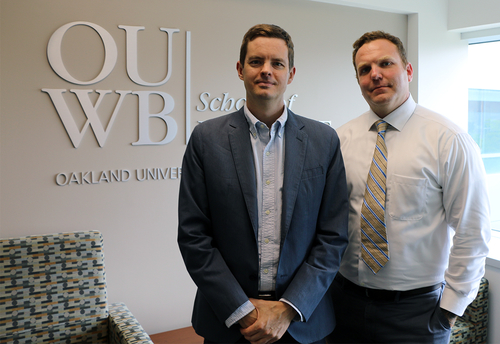
For the authors of “Treatment Over Objection — Moral Reasons for Reluctance,” the hope is to further the conversation about the requirements of humanistic medicine, and to move the bar on clinical ethics practices — particularly with regard to patients often marginalized.
Mark Navin, Ph.D., professor of Philosophy at Oakland University, Jason Wasserman, Ph.D., associate professor, Department of Foundational Medical Studies and Department of Pediatrics, Oakland University William Beaumont School of Medicine, and Mark Haimann, M.D., authored the paper scheduled for release in the October issue of Mayo Clinic Proceedings, a monthly peer-reviewed medical journal sponsored by the Mayo Clinic. The journal is one of the most widely read and highly cited publications in clinical medicine.
People who don’t reason well should have more say in their medical care, according to the two professors.
“We think the institutionalization of clinical ethics in recent decades has been good for patients and providers,” Navin said. “But clinical ethics guidelines sometimes fail to account for ethically important aspects of humanistic medicine.”
Navin said he and Wasserman have argued in recent papers that patients who do not reason well ought to have a greater voice in decision making about their medical care.
By example, the professors’ Mayo Clinic Proceedings article highlights a 63-year-old male patient with Down syndrome who is a candidate for pulmonary lobectomy but screams in opposition to the possibility of surgery when presented.
“Human beings who lack decision-making capacity are still persons from a moral point of view, and it is disrespectful to treat persons as bystanders or obstacles to their own care,” the article states. “In turn, when human beings express preferences, it is disrespectful to treat those utterances as morally irrelevant noise. Therefore, it is a requirement of respectfully treating decisionally incapacitated patients that physicians grant some moral weight to those patients’ treatment preferences.”
Navin and Wasserman feel so strongly about the issue that they also are working on a book about it.
“Ironically, bioethics emerged as a discipline in large part as an effort to give patients greater voice in what happens to them,” Wasserman said. “But those patients who are judged to lack decision making capacity continue to be rendered bystanders to their own care.”
Interdisciplinary collaborations take place on OU campus
Navin and Wasserman have been collaborating on projects for the last three years. The two also frequently collaborate with physicians, like they did with Haimann on the forthcoming Mayo Clinic Proceedings article.
“We draw on my background in philosophical ethics, Jason's background in medical sociology, and both of our experiences with clinical ethics consultation to illuminate issues surrounding respect, liberty, and power in clinical encounters,” Navin said.
Wasserman said “One of the great things about having both a medical school, as well as so many robust departments in the arts and sciences at the university, is that we can form these sorts of interdisciplinary collaborations, and also aim that work at real-world context to hopefully improve the lives of patients.”
With their new piece in Mayo Clinic Proceedings, Navin said the duo hopes its ideas get some uptake, or even some push-back, and that the conversation continues about the patients in question.
According to publication publisher Elsevier, Mayo Clinic Proceedings has a monthly circulation of about 123,000.
“We are especially happy that Mayo Clinic Proceedings has such a large audience of physicians and other clinical practitioners,” Wasserman said. “This piece builds from other work we've done in bioethics journals, and so we're very excited also to push these ideas out to people in medical practice.”
For more information, contact Andrew Dietderich, marketing writer, OUWB, at [email protected].

